Federal judges have handed down back-to-back dismissals in lawsuits filed by two Nebraska social media influencers, one against a TV network over on-air statements and the other against a sponsor who severed ties with her after anti-mask comments.
This week, Senior U.S. District Judge Joseph Bataillon granted MSNBC's parent company, NBCUniversal Media's, motion to dismiss the case Brandon Straka brought against them.
Less than two weeks earlier, U.S. District Judge Brian Buescher did the same with the lawsuit filed by Katie Starks against TULA Life Inc., a former sponsor of her blog who severed ties with her after she posted videos criticizing mask mandates, which prompted commenters to compare wearing them to the Holocaust.
In a lawsuit filed in December, Straka, a pro-Trump social media figure charged after encouraging rioters to attack the Capitol on Jan. 6, 2021, had targeted five statements made by political commentator Chris Hayes and chief legal correspondent for MSNBC Ari Melber that he alleged defamed him and put him in a false light.
People are also reading…
At the time, Straka called the Nebraska case the first in a string of strategic lawsuits he would be issuing in the coming months.
"I'm fighting for every American citizen, regardless of political affiliation, against an establishment that has turned on the American people," he said then in a post.
Straka, who got home detention and probation for his conduct, was seeking $25 million in the case filed by Virginia attorney Steven Biss, who previously represented former Congressman Devin Nunes and Russian academic Svetlana Lokhova in failed defamation lawsuits against CNN, the Washington Post and others over reports involving former President Trump's first impeachment inquiry.
Earlier this year, Straka voluntarily dismissed Hayes and Melber, but continued with the case against NBCUniversal Media.
Then, in a decision this week in Straka's case, the judge dismissed them, too, saying whatever differences there were between the reports, which said Straka had stormed the Capitol, and his conduct amounted to "semantic hair-splitting."
"The material challenged in the plaintiff’s complaint cannot be understood by a reasonable person as anything but substantially, if not literally, true. The differences between the statements NBC Universal published on cable television programs and the admissions Straka made in his criminal case are slight if not nonexistent," Bataillon wrote.
He said Straka's assertion that the on-air statements by Hayes and Melber were false were entirely contradicted by the factual basis of his guilty plea.
In Starks' case, filed in January, the lifestyle blogger sued TULA Life, a skincare corporation, for misattributing the comments comparing mask mandates with the Holocaust to her and indirectly labeling her "a racist."
But, in his ruling in late July, the judge said the statements TULA put out after her video simply stated that the company has "zero tolerance for racism or hate within (TULA’s) community" and ceased its partnership with her because of it.
Buescher said the statements do not hint at specific conduct committed by Starks, but were primarily about TULA and its policies.
"TULA’s two statements are not susceptible to verification as true or false. Rather, they merely express TULA’s 'subjective impressions' of Starks. Accordingly, the First Amendment bars Starks’ defamation claim," he said in dismissing the case.
Starks' California attorney, Roger Roots, argued TULA had violated his client's right to free speech by terminating the influencer agreement early.
But Buescher shot down the claim, saying Starks had injected herself in a public debate about COVID-19 policies and school mask mandates and encouraged others "to stand up to mask mandates and to stop financially supporting business(es) that would not take such a stand," which made her the subject of adverse publicity. So TULA had a right to terminate their agreement under the contract.
A Wyoming man was left with serious injuries after he was attacked by a grizzly bear in Shoshone National Forest.
Images of chaos: AP photographers capture US Capitol riot

Rioters scale a wall at the U.S. Capitol on Jan. 6, 2021, in Washington. (AP Photo/Jose Luis Magana)

Supporters loyal to then-President Donald Trump attend a rally on the Ellipse near the White House on Jan. 6, 2021, in Washington. (AP Photo/Julio Cortez)

Trump supporters participate in a rally in Washington on Jan. 6, 2021. (AP Photo/John Minchillo)

Trump supporters participate in a rally Jan. 6, 2021, in Washington. (AP Photo/John Minchillo)

Then-President Donald Trump gestures as he arrives to speak at a rally in Washington, on Jan. 6, 2021. (AP Photo/Jacquelyn Martin)

People listen as then-President Donald Trump speaks during a rally Jan. 6, 2021, in Washington. (AP Photo/Evan Vucci)

Supporters of then-President Donald Trump try to break through a police barrier at the Capitol in Washington on Jan. 6, 2021. (AP Photo/Julio Cortez)

A supporter of then-President Donald Trump is injured during clashes with police at the U.S. Capitol, Jan. 6, 2021, in Washington. (AP Photo/Julio Cortez)

A rioter pours water on herself at the U.S. Capitol on Jan. 6, 2021, in Washington. (AP Photo/Jose Luis Magana)
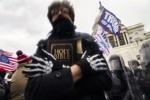
A Trump supporter holds a Bible as he gathers with others outside the Capitol, Jan. 6, 2021, in Washington. (AP Photo/John Minchillo)

Trump supporters try to break through a police barrier, Wednesday, Jan. 6, 2021, at the Capitol in Washington. (AP Photo/John Minchillo)

A demonstrator supporting then-President Donald Trump, is sprayed by police, Jan. 6, 2021, during a day of rioting at the Capitol.(AP Photo/John Minchillo)

Rioters try to enter the U.S. Capitol on Jan. 6, 2021, in Washington. (AP Photo/John Minchillo)

U.S. Capitol Police try to hold back rioters outside the east doors to the House side of the U.S. Capitol, Jan 6, 2021. (AP Photo/Andrew Harnik)

Rioters gather outside the U.S. Capitol in Washington, on Jan 6, 2021. (AP Photo/Andrew Harnik)

Protesters gather outside the U.S. Capitol, Jan 6, 2021. (AP Photo/Andrew Harnik)
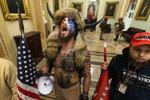
Jacob Anthony Chansley, center, with other insurrectionists who supported then-President Donald Trump, are confronted by U.S. Capitol Police in the hallway outside of the Senate chamber in the Capitol, Jan. 6, 2021, in Washington. Chansley, was among the first group of insurrectionists who entered the hallway outside the Senate chamber. (AP Photo/Manuel Balce Ceneta)

U.S. Capitol Police hold rioters at gun-point near the House Chamber inside the U.S. Capitol on Jan. 6, 2021, in Washington. (AP Photo/Andrew Harnik)
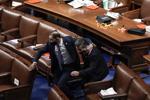
Lawmakers evacuate the floor as rioters try to break into the House Chamber at the U.S. Capitol on Jan. 6, 2021, in Washington. (AP Photo/J. Scott Applewhite)
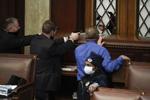
Police with guns drawn watch as rioters try to break into the House Chamber at the U.S. Capitol on Jan. 6, 2021, in Washington. (AP Photo/J. Scott Applewhite)

Congressmen shelter in the House gallery as rioters try to break into the House Chamber at the U.S. Capitol on Jan. 6, 2021, in Washington. (AP Photo/Andrew Harnik)

Members of Congress wear emergency gas masks as they are evacuated from the House gallery as rioters try to break into the House Chamber at the U.S. Capitol on Jan. 6, 2021, in Washington. (AP Photo/Andrew Harnik)

The House gallery is empty after it was evacuated as rioters try to break into the House Chamber at the U.S. Capitol on Jan. 6, 2021, in Washington. (AP Photo/J. Scott Applewhite)

Rep. Andy Kim, D-N.J., cleans up debris and personal belongings strewn across the floor of the Rotunda in the early morning hours of Jan. 7, 2021, after rioters stormed the Capitol in Washington. (AP Photo/Andrew Harnik)

Members of the DC National Guard surround the U.S. Capitol on Jan. 6, 2021, in Washington. (AP Photo/Julio Cortez)
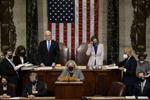
Vice President Mike Pence and Speaker of the House Nancy Pelosi, D-Calif., read the final certification of Electoral College votes cast in November's presidential election during a joint session of Congress after working through the night, at the Capitol in Washington, Jan. 7, 2021. (AP Photo/J. Scott Applewhite, Pool)

A flag hangs between broken windows after then-President Donald Trump supporters tried to break through police barriers outside the U.S. Capitol, Jan 6, 2021. (AP Photo/John Minchillo)

A flag that reads "Treason" is visible on the ground in the early morning hours of Jan. 7, 2021, after rioters stormed the Capitol in Washington. (AP Photo/Andrew Harnik)

An ATF police officer cleans up debris and personal belongings strewn across the floor of the Rotunda in the early morning hours of Jan. 7, 2021, after rioters stormed the Capitol in Washington. (AP Photo/Andrew Harnik)

Fencing is placed around the exterior of the Capitol grounds, Thursday, Jan. 7, 2021 in Washington. The House and Senate certified the Democrat's electoral college win early Thursday after a violent throng of pro-Trump rioters spent hours Wednesday running rampant through the Capitol. A woman was fatally shot, windows were bashed and the mob forced shaken lawmakers and aides to flee the building, shielded by Capitol Police. (AP Photo/John Minchillo)









